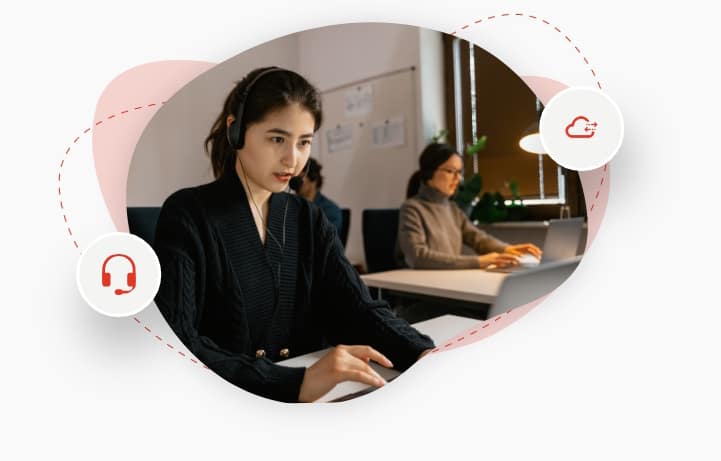
In today's fast-paced world, many businesses are improving their communication channels by using VoIP, which allows communication to take place over a broadband internet connection. VoIP (Voice over Internet Protocol) services were previously only available to large corporations and multinational corporations. However, today, small and medium-sized businesses can also benefit from VoIP services. Pulse, the best VoIP service provider in India, offers customised VoIP services for small and big enterprises.
VoIP systems allow you to conduct business with multiple communication methods, including phone calls, SMS messages, emails, video conferences, and video conferencing. It helps decision-makers make better decisions and increases collaboration and workflow.
But that's all well-known. The latest news is this: VoIP and IoT can be used together to create new solutions and advancements. VoIP platforms are already being merged with popular mobile platforms, including Android operating systems, which allows for a wide range of activities.
Our article gives you a glimpse into the future of VoIP and how this technology will merge with other technologies to benefit us.
VoIP & IoT
VoIP devices are becoming more than just devices for transmitting voice and video packets. They are the foundation for the Internet of Things (IoT). With the rise of IoT, VoIP will play a bigger role in the IoT's data capture and transmission levels. When used together, VoIP and IoT can be used by businesses to create smart offices where employees can access all of the information they require from any location.
Some of the other benefits of having VoIP systems with IoT include:
VoIP is already phasing out analogue telephones. This connection with IoT will result in more businesses investing in flexible communication systems in the coming years.
VoIP & 5G
In the near future, VoIP service providers may provide customers with 5G technology, which will enable faster connection speeds and better call quality. VoIP is expected to increase demand and benefit from increased transfer speeds with the upcoming 5G network. VoIP and 5G networks will help businesses by:
Customers' expectations will rise due to faster communication speeds brought about by 5G, and artificial intelligence will help increase response rates.
VoIP & Artificial Intelligence (AI)
AI will continue to be present in our lives on the websites we visit and on our social media feeds. VoIP will also continue to operate in the same manner in the coming years. Artificial intelligence will be used to:
Language processing technology will help VoIP systems become more intelligent and be used for more than just internet searches. Virtual assistants will route calls to agents and answer simple questions. They will also collect information about your customers, making it easier for your agents to provide a more personalised level of service.
VoIP & Cloud Computing
Cloud computing is the future of business communications and will enable greater scalability, HD audio quality, and a unified communication system.
Cloud-based phone systems are more affordable than in-house networks, and the UCaaS market is expected to reach $24.8 billion by 2024. Businesses can gain quick access to their data, audio, and video communication through any internet-connected device with Unified Communications as a Service.
More businesses are moving their communications to the cloud and can prepare their communications infrastructure for the future. However, before purchasing UCaaS, you should learn more about its workings and discover what problems you might encounter.
Mobile VoIP
More businesses are recognising that mobility is an important factor in their respective industries and can help them gain a competitive advantage. Global spending on mobile VoIP will reach $1.8 trillion by 2022.
Mobile VoIP systems will be supported by new 5G networks and used to make business calls, conference calls, and team meetings. Mobile VoIP is a huge benefit for professionals, allowing them to conduct business calls and conferences much more easily.
VoIP in schools
VoIP systems are being used in schools to improve online learning, conduct seminars and other supplementary classes, and improve unified communication within their organisation and with their customers (students and parents). The most important takeaways of this article are that both teachers and students require mobility and that VoIP systems can be used to conduct classes even while at home.
Video-Conferencing
VoIP service providers are under pressure due to the popularity of video chat services among Millennials and Generation Zers. These video chat services are increasing in popularity because they reduce the handling time and increase close rates.
Despite the annual growth rate of the VoIP service industry being -3.6 per cent between 2014 and 2019, VoIP technology continues to advance. It is now possible to seamlessly utilise VoIP solutions with video conferencing. Video chat services can be used with VoIP systems to increase close rates and decrease handle time.
WebRTC
The WebRTC standard allows for instant calls and real-time video streaming. Direct calls from the web browser and the exchange of files between peers can benefit from WebRTC. Many people believed that WebRTC would eventually phase out VoIP, but that has not been the case.
WebRTC is a free and open-source standard for real-time communications in browsers. It is well suited for use with VoIP systems. WebRTC will be implemented alongside VoIP platforms shortly, streamlining business communication systems.
Security concerns have increased as internet use has grown, particularly when data is almost as valuable as currency. In the past, 40 % of industrial computers were the targets of cyberattacks, making information integrity a difficult challenge today. However, more people are working from home, and more malware is being spread through Portable Executable Formats.
VoIP systems that use broadband internet connections are more vulnerable to security breaches than traditional telephone systems, and companies must protect their VoIP systems with firewalls and advanced security features. The most effective method of ensuring that you are protected is identifying leading cybersecurity vendors and becoming familiar with data security best practices.

The Bottom Line
In the digital age, VoIP has the potential to become the de facto standard technology for business communications. But more and more businesses are experimenting with new communication strategies. Hopefully, our article has given you a better understanding of how you can take advantage of these shifts to gain a competitive advantage.
Pulse Unified Communication Service Provider, India, offers your organisation feature-rich, advanced VoIP services. Build your connections and secure your business with Pulse.